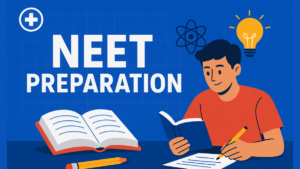NEET is among the most competitive exam in India. Being the sole undergraduate medical entrance exam, the exam sees the participation of more than 21 lakh candidates. The competition is increasing day by day. So just doing hard work like everyone else does not guarantee a medical seat. To guarantee a medical seat, one should start studying for NEET from class 10 itself. In this article, we will provide students answer to the question- How to prepare for NEET exam from class 10?
How to Prepare for NEET Exam From Class 10
Starting the preparation for the NEET exam in class 10 give students an edge over other students who will start their preparation one or two years later. Students from class 10 get around 3 years to prepare for the NEE UG exam. The time of 3 years is sufficient not only for getting seat in a good medical college, but for even topping the NEET exam. But to do so, students must follow the steps provided in the article for NEET preparation from class 10.
How to Start NEET Preparation From 10th Class
The level of competitiveness is rising daily in parallel with the annual increase in NEET registrations. Those who want to take the NEET exam need to begin preparing as soon as feasible. Once candidates thoroughly study and analyze the exam, they will be able to pass the medical exam with ease. Candidates can start preparation for the NEET exam from class 10, a trend seen in many NEET toppers.
By starting their preparation form 10th class, students will be able to understand the fundamentals straight away and have enough time to get their questions answered in preparation for the NEET exam. One can easily pass the exam with good marks and ranks if they follow the proper strategy, make a methodical plan, and receive guidance. The complete strategy to crack the NEET UG exam for a class 10 student is given hereunder.
Check: NEET Exam Pattern
NEET Preparation Strategy for Class 10 Students
The best approach is to begin NEET 2024 preparation in class 10. NEET 2024 does not include the syllabus for Class 10, however preparation from that level improves the fundamental concepts that candidates will cover in Classes 11 and 12. Aspirants will benefit from understanding the topics covered in the NEET syllabus by starting their NEET preparation in Class 10. The following lists the practical methods that interested candidates can use to begin preparing for NEET 2024 in class 10.
Understand the NEET Syllabus
Candidates need to thoroughly understand the syllabus in order to prepare for the NEET. Comprehending the NEET syllabus will equip you with the essential knowledge to concentrate on improving your preparations. The subjects included in the NEET exam syllabus are Chemistry, Physics, and Biology (Botany and Zoology). Checkout the latest NEET exam syllabus below.
NEET Updated Syllabus 2024
There will be 50 questions in each subject on the NEET question paper, for a total of 200 multiple-choice questions. Of all the questions, students are required to attempt 180 questions. Understanding the Class 10 NEET curriculum will enable applicants to identify the easiest and hardest areas of the entire syllabus, helping them to prepare for the Class 10 NEET more effectively.
Make a List of Important Topics
After becoming familiar with the syllabus, candidates need to concentrate more on the crucial topics or chapters for NEET UG. Topics that have high weightage in the NEET exam score should be prioritized more. Aspirants would be able to avoid the confusion of last-minute preparations by learning the key themes included in NEET exam early on. Important NEET topics from each subject are listed below.
Check: NEET Chapter-wise Weightage and Important Topics
Create a Study Plan
Three subjects are covered in the NEET exam: biology, chemistry, and physics. Candidates can create a productive study plan to help them understand the material by knowing the topics. Creating a study plan is not sufficient; applicants also need to stick to it every day. Candidates need to create a detailed schedule that will enable them to break down the NEET syllabus in order to start preparing for the exam in Class 10.
The NEET schedule needs to be designed such that applicants can devote the same amount of time to each topic. Adhering to the study plan can assist candidates in upholding appropriate self-discipline during their daily study sessions and better equip them to score highly on the NEET exam.
Study From Standard Resources
75–80% of the NEET questions are from the NCERT syllabus for classes 11 and 12. NCERT must therefore be learned. While NCERT textbooks are the gold standard for every subject, candidates should also take into account other excellent books from Class 10 that are essential for NEET 2024 preparation.
After finishing their textbook preparation, the majority of students are perplexed and have just one question: “Are NCERT books sufficient to pass the NEET?” And the response is that while NCERT is the finest book for preparation, reading other books will help you stand out. Candidates can checkout the list of best study resources for different sections of the NEET exam by clicking the link given below.
Check: NEET UG Section-wise Books and Preparation Strategy
Focus on Conceptual Learning
After learning about the entire curriculum, Class 10 candidates getting ready for the NEET exam need to concentrate on conceptual questions. The best resource for understanding topics and dispelling doubts is an NCERT science textbook. Concepts should be paid attention to, and understanding should take precedence over memorization. It’s important to develop this habit early on. Take notes and give ideas enough time to be developed.
Solve Abundant Questions
One must complete a significant number of problems from the NCERT textbooks and other top NEET books while studying for the NEET exam from Class 10. As the NEET exam will only include objective questions, candidates must familiarize themselves with the format of the questions.
Aspirants are also advised to tackle the chapter-related problems from the textbooks each time they complete a chapter. While answering such questions will undoubtedly aid in their board exam preparation, after finishing their NCERT textbook study, they ought to prioritize answering the more difficult questions.
Solve PYQs and Mock Papers
With ample time to prepare for NEET, upcoming Class 10 medical applicants must begin using NEET’s previous year’s question papers and mock papers. Candidates’ speed in answering questions would be aided by solving the NEET mock exam. Students can anticipate what to expect on the NEET exam by referring to previous year questions (PYQs) from the past year’s examination papers.
Identify and Work on Weak Areas
After solving many questions, previous year papers and mock tests, students should analyze their performance and make a note of strong and weak areas. By following the books mentioned above and beginning NEET preparation in Class 10, applicants would undoubtedly know where they stand and fall short in each subject. As candidates get ready for NEET starting in Class 10, they will have ample time to rework their strong parts and strengthen their poor ones. In order to finish the curriculum, the study hours might be split up among them.
Revise Regularly
The extensive NEET syllabus takes time for candidates to finish. Therefore, it is advisable to start NEET preparation in Class 10 to ensure that students have the time to make excellent preparations. An applicant must retain information in their memory for a certain period of time after finishing a topic, subject, or chapter.
The prepared chapters, themes, or topics will always stay fresh in their minds with the appropriate revision of each one. As a result, on the big day of the NEET exam, candidates will be less confused. At least 40–50 MCQs on each topic must be consistently answered for improved preparation.
Best Tips to Prepare for NEET Exam From Class 10
Students should remember these golden tips while they start preparation for the NEET exam from class 10. Students will have ample time to put various preparation techniques into practice, understand the fundamentals, and focus on their weakest areas.
- Understand the entire syllabus
- Create a thorough plan
- Recognize the key subjects
- Make the concepts clear
- Solve as many questions as you can
- Consult further books
- Decide which sections are the strongest and weakest
- Become familiar to the previous year’s exam papers and mock tests
- regular subject revision
- Steer clear of overconfidence












 NEET Preparation Strategy 2026: Detailed...
NEET Preparation Strategy 2026: Detailed...
 Free NEET Sample Papers 2026 PDF | Downl...
Free NEET Sample Papers 2026 PDF | Downl...
 Salt Analysis NEET Notes, Check Importan...
Salt Analysis NEET Notes, Check Importan...







